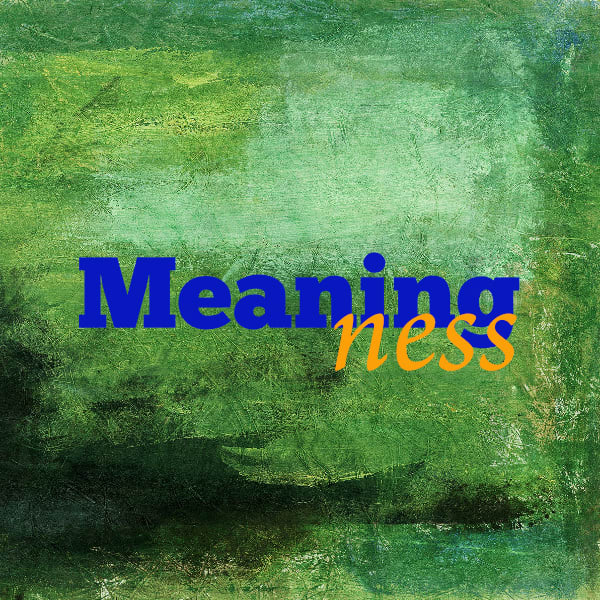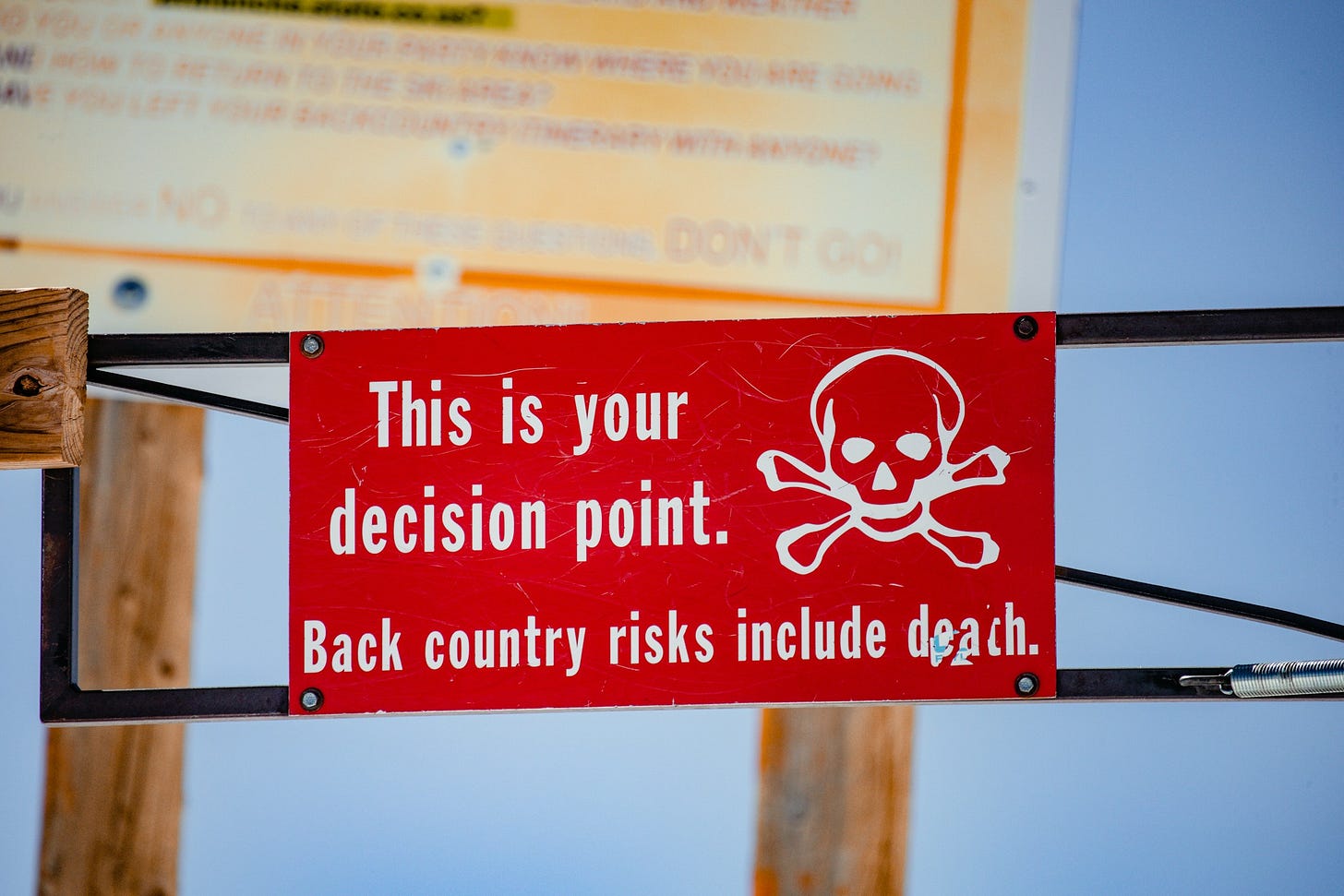My 70% failure rate
Risk-taking and productivity. Plus: how to save democracy, and too much fun!
In this monthly News&Notes issue:
🙋 Monthly live video AMA, plus Substack chat: Be there or b²!
࿇ Monthly Vajrayana Q&A Zoom: Next Saturday, November 9th
🇺🇸 The Court of Values and the Bureau of Boringness: How to save democracy
😱 Fear of failure: Choosing a risk level for creative work
🥳 Too much fun: I suddenly re-remember a promise
📝 Half-baked: Why philosophy is bad, and the non-discovery of the Higgs boson
🎥 Let’s make movies: short videos you may have missed
🌞 Some updated LED recommendations: against the ❄️ winter blahs
Substack live video AMA: November 23rd
To facilitate community, a couple weeks ago I hosted an AMA (“Ask Me Anything”) via Substack’s new live video feature. About fifty people participated! I enjoyed it, and hope everyone else did too. So I’m doing another one!
There’s more explanation here, and this is the recording from last month’s:
The next live video session will be Saturday, November 23rd, at 9 a.m. Pacific Time; noon Eastern.
It helps me if you can suggest questions ahead of time, so I’ve opened a chat thread for that. We can also use that thread for general discussion!
To participate in either the chat or the live session, you need to subscribe (free or contributing), if you haven’t already.
Substack live streams are available only through the app, on mobile devices:
If you have the app open when the live sessions starts, you’ll get a notification with one-click instructions for how to get in.
Vajrayana Q&A
Vajrayana is the unusual branch of Buddhism I discuss here on Substack, and on Vividness and Buddhism for Vampires. I offer live Zoom gatherings monthly, answering questions, and maybe asking some, and facilitating discussion. (Co-led with Jared Janes, Evolving Ground co-founder). You can read more about the purpose and format here. You can watch a recording of part of last month’s session here:
And another chunk is here:s
The next Q&A will be this coming Saturday, November 9th, at 10:30 a.m. Eastern / 7:30 a.m. Pacific. It’s is available only to Evolving Ground members, but membership is free. If you sign up, you’ll get an email with information on how to access the eG Discord forum. The top item in the forum is Events, and if you scroll the Events to the session date you’ll get the zoom link.
Think ahead and bring your puzzlements, problems, and excitements! I’d like more questions and less answering in the next session—I can drone on for hours, but it’s more fun for everyone with more back-and-forth.
How to save American democracy
Once again Americans get a choice between two presidential candidates who are both actively disliked—not merely dispreferred—by half the country. Outside of election season, politics is dominated by culture war debates, concerned with who gets how much ritual status. It’s not surprising that government works less well than one might hope. How can we free it to get on with the boring pragmatic business of governing?
Just before the 2016 election, I proposed a new voting system that would fix this problem. I thought it was mainly a joke at the time; and I hope you will enjoy it as light entertainment during the runup to a tense event. However, the proposal seems increasingly serious and plausible in the light of subsequent events. It’s “The Court of Values and the Bureau of Boringness.”
I’ve written several other pieces about ways to improve politics, among them “Deflating tribal drama” (also 2016) and “Vaster than ideology” (2021).
I found interesting Scott Alexander’s recent post about the internal psychodrama of voting. Both parties, and both their candidates, are awful. The temptation is to vote against whichever party you once supported, and which you now feel betrayed by. This makes emotional sense, but is not rational, and will have bad consequences. I agree with Scott that one should overcome this urge, and vote against the overall worse alternative.
Scott endorses specific candidates on this basis, which is rational. I have previously endorsed
for President; and despite Scott’s rational arguments, I feel it would be churlish to retract my publicly stated choice now.Choosing a risk level for creative work
When I was a graduate student, and then a PhD AI scientist, I aimed for a 70% failure rate in my research projects. I’d work on something for a few months, sometimes a year, and if it didn’t work out, I’d declare it failed and move on. I believed that if I had a greater success rate, it would mean I wasn’t being ambitious enough; not taking enough risk.
A project I’m confident I can complete is probably one anyone could. So someone will, so there’s no point in my duplicating their work. And it probably wouldn’t be innovative enough to be interesting, anyway. There’s a strong (not perfect) correlation between a project’s riskiness and the value of success.
More scientists should be incentivized to take greater risks. I was very lucky to be in a place and time when it was feasible to do that. Even back in the ’80s, for most scientists batting .300 would be career suicide; and publish-or-perish has tipped far toward “perish” since then. This is unfortunate.
I was reminded of this due to several writing attempts failing this past month. For one, I had planned a Halloween special post about the psychology of reading vampire fiction, and its cultural significance. I have much to say about that. It turned out to be too many things, which didn’t come together as a coherent essay with a clear through line and a satisfying conclusion.
I also tried to write about ethics and politics in software project leadership; an explanation of why what I do is not philosophy; and the conceptual incoherence of monastic Vajrayana. None of those quite worked either.
In most cases, scientific research has to get finished soon, or the field will have moved on and someone else will have got the answer. So why bother doing it yourself? (This is part of why I left science.)
That’s true for some of my drafts, too. For instance, I think a lot about contemporary social and cultural trends, and often begin writing about some insight which (as far I know) no has had before. But by the time I’ve gotten it nailed down, society and culture have moved on. (There’s not much point writing about “wokeness” anymore, is there?)
Most of what I write is timeless. I develop an idea into a draft; I run into trouble and the draft doesn’t come together; I let it rest; and then weeks or months or years later, it may suddenly become easy. I’ve been working on the psychology-of-vampires essay since 2010. It probably won’t be obsolete when or if I ever finish it. Vampires are long-lived and don’t change much. I met a two-thousand-year-old one in a Starbucks once.
This last month’s failures are much smaller projects than a year-long scientific investigation, and may well become successes at some point. So, is a 70% failure rate still the right thing to aim for? And, if most pieces never become irrelevant, and may rise from the dead years later, what does “failure” even mean? And what is my current “failure rate”?
My ratio of unfinished to finished pieces is much greater than 7:3. Is that good, or bad?
Should I aim to finish more, at a cost in quality and interestingness?
Highly successful bloggers turn out something several times a week. I imagine I could do that. I don’t want to. Nobody (except
) can find something new and interesting to say that often. Commenting on each day’s political news—which is where the money is!—would duplicate others’ work anyway. At the other extreme, I don’t want to wait years to publish a finished book, and then go silent for a few years before the next.What’s the right level of risk? Usually I think I’ve got it roughly right, but after a month in which I complete nothing, it doesn’t quite feel like that.
By coincidence, a couple hours after writing this section, I listened to a new podcast episode in which
and discuss risk-taking in scientific research, project selection, and the psychology of writing up ideas, with observations similar to mine here. Recommended!I also recommend a recent post by
about essay writing, and the psychology of repeated failure and eventual success when working through ideas:I don’t yet know what the solution to the puzzle is going to be. I might not even know precisely what the puzzle is. My formulation of the puzzle might be wrong. This can be frustrating, daunting, overwhelming, etc– but like Miyazaki said about creative struggles, if it went away, I’d want it back. I want to work on this sort of complex puzzle!
My planning and plotting is done mostly at an intellectual level, and is always going to be a layer removed from the emotional heart of the matter, which is always going to be something dynamic, something alive, something I have to approach afresh, anew... I do believe that there is a real aliveness always humming beneath that which seems stale and frozen. I just need to feel my way to it. It’s calling to me always. I just need to feel my way to it.
Delivering too much fun
I somehow forgot that in the About page I promised paying subscribers some posts that are too much fun for serious publication! I delivered this month, with this short, extremely silly, but entirely true story about how hippies levitated the Pentagon (or, some of them claimed they had) using battle magic from Medieval India, and how that partially explains why Tibetan Buddhism is conceptually incoherent:
(There’s a short free section as a taster to induce you to become a paying subscriber to hear the rest.)
I hadn’t initially intended a paid Substack option, partly because I was unsure I could deliver anything. In previous years, persistent circumstantial obstacles often prevented me writing for stretches of many months. By early this year, I had gotten those sufficiently under control that I was reasonably confident I could produce something every month, wrote an About page, and enabled paid subscriptions.
I’ve been greatly encouraged by the reader/listener/viewer enthusiasm that manifested!
When I suddenly remembered last month that I had promised paying subscribers some silly stuff, and hadn’t done that in a while, and realized that the “battlemage” story would fit— I also realized that the About page was dated. My understanding of what I am doing is still extremely confused (as I often say in these News & Notes posts), but it’s definitely different than it was in February. So a few weeks ago, I did a major rewrite of the About.
I have a queue of “too much fun” draft pieces. I’d like to post one a month, as a thank-you to paying subscribers (and reminder to free subscribers that they might like to upgrade). I’m not sure I will deliver that, but I have good intentions :) Sometimes I also paywall the second half of long serious posts, which may remind you of value received if you find them useful.
Philosophy is bad, the Higgs boson, and should I post more half-baked stuff?
I use Substack Notes for bits of writing that are often more than tweets but aren’t worked-out enough, or don’t seem important enough, for full Posts. I wrote several more substantial Notes in October than previously (probably partly because I was frustrated in trying to write long pieces).
This isn’t how Substack wants you to use Notes. They’re meant to be throw-aways, it seems. Substack used to provide a chronological feed of Notes from people you follow, but nuked that last month. So if you visit the web site, or use the app, you get a random selection of Notes an algorithm wants you to see, instead. You can see all my Notes here, but you’d need to remember to visit that URL regularly, and who would do that?
I am wondering now whether it would be better to make short pieces Posts, marked #half-baked, and give subscribers an option on whether they want to get emails/notifications for those? (This may be technically possible.)
Or perhaps I could bundle together whatever half-baked ideas I’ve had into a weekly Post you’d get by email?
What do you think?
I’ll highlight a couple recent Notes that may have deserved Posts:
Philosophy is bad
This Note got an unprecendent number of replies, many of them emotionally unhinged:
This was an off-hand half-baked thought, due to my bad brain trying to convince me that I need to explain what is bad about philosophy, and how what I do is not that. It gets excited about this topic once every few months, and I’m unable to stop it from posting some brief cryptic note about it (previously, e.g., this and this and their reply chains).
I really don’t want to write about philosophy and what makes it bad, because there’s an enormous amount to say, which could easily turn into another unfinishable incremental-giant-book project. Also, it gets amateur philosophy enthusiasts extremely upset, which is sort of funny, and helps me understand how they think, but is mostly tedious.
However, the possibility is also extremely important, because philosophy has done so much damage to our ability to make sense of ourselves, each other, and our world. So, my bad brain may (once again!) win this fight.
Did CERN discover the Higgs Boson?
, a statistics professor (more-or-less) at UC Berkeley, often posts fascinating meta-rational insights about science and how it is done. A couple weeks ago, he wrote a provocative and less-than-fully baked piece about the purported “discovery” of the Higgs boson.I found it fabulous, and reflected on it in this Note:
Both my Note and Ben’s post got many hostile replies, based apparently on missing the point, which (to be fair) neither of us made especially clear. I followed up with a nearly-Post-length clarifying Note:
And Ben also wrote a careful and insightful follow-up Post, worth reading:
Short videos you may have missed
I’ve been publishing a few of these each month as Substack Notes. They’re easy to miss, so I include them in the News & Notes posts as well. You could also follow me on YouTube; I cross-post most but not all video from there to here and vice versa.
Readers’ anti-winter LED recommendations
Two posts last year explained how VERY bright lights can chase off winter: “YOU NEED MORE LUX” and “Seriously bright light vs. winter blahs.”
Absolutely tons of people tweeted that they tried this, and it dramatically improved their lives—much more even than I was expecting.
LED technology improves every year, so in last month’s News & Notes post, I asked for readers’ experience and recommendations with particular products. Three of you wrote back—thank you!
Kyle recommended an Amazon own-brand 300W corn bulb. It’s $100 right now, which is a good price for the power. He says “I got this a year ago for my office and it's been going great!”
William reported good results with the 600W panel I recommended last year:
While it doesn't come with a plug (just wires - some assembly required), the nice thing about it is that you get 10k lux about 8 feet away, so you don't have to have it right in your face. It also doesn't put off too much heat.
By a very weird coincidence, he posted his comment two hours after I installed one just like it! (I bought it last winter because it was on sale, and didn't get around to getting it mounted.) I found it hot enough that, out of abundance of caution, I rested it on silicone pads sold for protecting kitchen surfaces from hot cooking pots.
Andrew Ormerod wrote:
I can share the set up that I have and the stores in the UK I got it from for the benefit of fellow Brits in need of bright lights this winter.
I have:
- 2 x 100W LED corn bulb - https://www.lampshoponline.com/bright-source-100w-led-corn-light-e40-cap-6000k.html
- 2 x CFL plugin bulb holders rated at least 100W - https://www.reptiles.swelluk.com/swell-ceramic-lamp-holderThis is obviously all you really need for the basic set up, and was what I had last year. Because I am the 'midcentury modern' type, I had to try and make it look a bit nicer this year, so my my aesthetic additions are:
- 1 x strong white 24.5L Really Useful Box - https://www.reallyusefulproducts.co.uk/uk/html/onlineshop/rub/b24_5litre.php
- 1 x roll of relfective radiator foil, to line the box - https://www.screwfix.com/p/essentials-470mm-x-4m-radiator-heat-reflector-foil/88629- 2 x sets of 4 speaker spikes - https://www.amazon.co.uk/PrecisionGeek-Black-Speaker-Spikes-Adhesive/dp/B08XZG2179
- 1 x fancy extension cable to power both lights and run from the box to the plug socket - https://holly.co/shop/product/lolas-leads-fabric-extension-cable-in-raspberry/bbc06f70-9512-4bb4-8ecb-2084c7de81baI can easily slip the front cover of the box on and off when turning the lamps on and off.
In addition to product recommendation updates, there’s a couple of major loose ends in last year’s posts I’d like to address:
One is the mysterious disappearance of floor lamp stands rated above 100W. If I still can’t find that, I may build one from parts and provide the recipe. (It’s just a stable base, a pipe, a zip cord, and a socket! How hard can this be?)
The other is the possible subjective benefit of high CRI (color rendering index) bulbs.
Whether I’ll have time for these… I don’t know!












Re: philosophy, I would find something exploring the boundary of what you consider to be in-category for philosophy useful. Some central examples, some boundary examples, some things others often think are philosophy but aren't, some things that people think aren't philosophy but are...my current conclusion is that you're using the word in a way I really don't understand but that I'd probably agree with you if I understood what cluster you were gesturing at.
RE philosophy being bad: Nishijima Roshi once described enlightenment as the experience of "dropping away of all philosophical problems". When I look at my own practice, it is usually obvious to me when I'm doing philosophy and when I'm not. Noticing that and letting it go is useful. Defining what philosophy *is* may be intellectually interesting but more useful is learning to recognize experientially what doing philosophy feels like. (And then not doing it.) Typically, some kind of confused stance is involved. Broadly it feels like taking your thoughts (typically expressed in discursive, representational language) as more "real" than experience or actions or "what's right there in front of you".
I find this to be sufficient in most situations. Not sure if pinning down a definition will add much more to it. Trying to pin down definitions is one of the fatal flaws of philosophy, after all!
Still, if you even do finish that essay, I'd love to read it! You've built up too much anticipation over the years. ;)